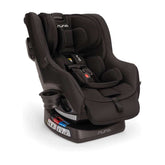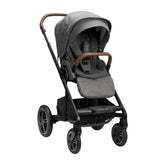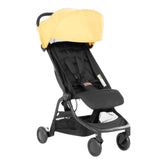Taking Medicine While Breastfeeding? What's Safe, What's Not

Updated 7 Jan 2025
Every parent wants to give their baby the very best start possible in life. If you’re nursing, that means being conscious of the types of food and drink you put into your body and what could show up in your breast milk. But what do you do if you need to take medication? Let’s take a closer look at how drugs affect breast milk, what’s considered safe, and what medications to avoid while breastfeeding.
Medications in Breast Milk
Generally speaking, any medication that’s present in the bloodstream will show up in breast milk to some degree. Most drugs transfer only at minimal levels and won’t actually harm most babies. That said, there are exceptions. Certain medications show up in much higher concentrations in breast milk. Consequently, each drug should be evaluated individually.
An infant’s health and age should also be taken into consideration. Newborns, preterm babies, and infants who are medically unstable or who have kidney issues are at a higher risk of complications from exposure to medication in breast milk. Babies who are 6 months or older are better able to metabolize any medications in breast milk and have the lowest risk for complications. It’s also worth noting that any drugs used in the 48 hours following delivery tend to be present only in very low levels in breast milk since most mothers produce a minimal amount during this time.

Can I Take Medication While Breastfeeding?
A 2013 clinical report by the American Academy of Pediatrics (AAP), “The Transfer of Drugs and Therapeutics into Human Breast Milk: An Update on Selected Topics,” says that most medications and immunizations are safe to use while breastfeeding. Per AAP recommendations, healthcare professionals should carefully assess the risks and advantages before prescribing medications to breastfeeding mothers. This evaluation should take into account the following factors:
- The necessity of the medication for the mother.
- The potential impact of the drug on milk production.
- Quantity of the drug transferred to human milk.
- Degree of oral absorption by the breastfeeding infant.
- Possible adverse effects on the breastfeeding infant.
- The baby’s age.
- The proportion of feedings that consist of breast milk.
By considering these factors, healthcare providers can make informed decisions regarding the use of medications in breastfeeding mothers while prioritizing the well-being of both the mother and the infant.
In 2015, the Food and Drug Administration (FDA) started requiring prescription drug manufacturers to meet new labeling standards that offer more current and straightforward information specific to lactating parents. Under the new regulations, drug manufacturers must divulge the amount of the drug that ends up in breast milk along with any possible side effects on nursing infants. They must also disclose details on any research that’s been done and any adverse reactions in nursing parents. This data can help you and your doctor better evaluate the risks and benefits of taking a particular drug while you're nursing.
Nearly all over-the-counter and prescription drugs feature a warning label to “consult a doctor before taking if you're nursing.” In other words, a conversation with your doctor or pediatrician is going to be your best resource for accurate information. They can give you feedback on common medications that are safe for nursing parents and advice on whether they need to be adjusted until you’re done breastfeeding.

List of Medications That Are Safe While Breastfeeding
In the meantime, the following medications have been found safe to consume during breastfeeding, according to the Mayo Clinic. Consult with your doctor before taking anything, and bear in mind that this isn’t a complete list of safe medicines.
Pain relievers
- Acetaminophen (Tylenol, others)
- Ibuprofen (Advil, Motrin IB, others)
- Naproxen sodium (Aleve, Anaprox DS, others) — temporary use only
Antimicrobial medications
- Fluconazole (Diflucan)
- Miconazole (Monistat 3, Monistat 7, others) — apply a minimal amount
- Clotrimazole (Mycelex, Lotrimin AF) — apply a minimal amount
Antibiotics
- Penicillins, such as amoxicillin and ampicillin
- Cephalosporins, such as cephalexin
Antihistamines
- Loratadine (Claritin, Alavert, others)
- Fexofenadine (Allegra Allergy)
Decongestants
- Medications containing pseudoephedrine (Sudafed, Zyrtec D) — use with care as pseudoephedrine can lower milk supply
Birth control
- Progestin-only contraceptives, also known as the minipill
- Combination contraceptives containing estrogen and progestin — talk to your healthcare provider about this option as research is still unclear about whether this type of medication affects lactation
Gastrointestinal medications
- Famotidine (Pepcid, Zantac 360)
Antidepressants
- Paroxetine (Paxil, Brisdelle, others)
- Sertraline (Zoloft)
- Fluvoxamine (Luvox)
Constipation medications
- Docusate (Colace, Phillips' Stool Softener, others)

List of Medications to Avoid While Breastfeeding
Some drugs, however, are unquestionably harmful. These include (but aren’t limited to) the following:
- anticancer drugs
- lithium
- oral retinoids
- iodine
- amiodarone
- gold salts
If you need to take a medication that isn’t safe for nursing mothers and infants, your doctor may be able to suggest an alternative medication or recommend nursing when the medication is at a reduced level in your breast milk. For example, you may be able to take your medicine right after breastfeeding or just before you put your baby to bed for the evening. In some cases, you may need to stop breastfeeding temporarily. If this is the case, you can continue to pump in order to maintain your milk supply until you’re able to nurse again. Be sure to toss out the milk you’ve expressed while taking the medication (a.k.a. "pump and dump").
You can also review the National Library of Medicine's Drug and Lactation database (LactMed) or the Infant Risk Center for more details on which drugs are safe and which aren't when you're nursing a baby. If you do begin a new doctor-approved drug, watch your infant for any unusual changes such as fussiness, a rash, or a change in eating or sleeping habits. If you do observe anything unusual, consult your healthcare provider.
Disclaimer: The information on our site is NOT medical advice for any specific person or condition. It is only meant as general information. Please contact your health provider if you have any medical questions or concerns about your child or yourself.









